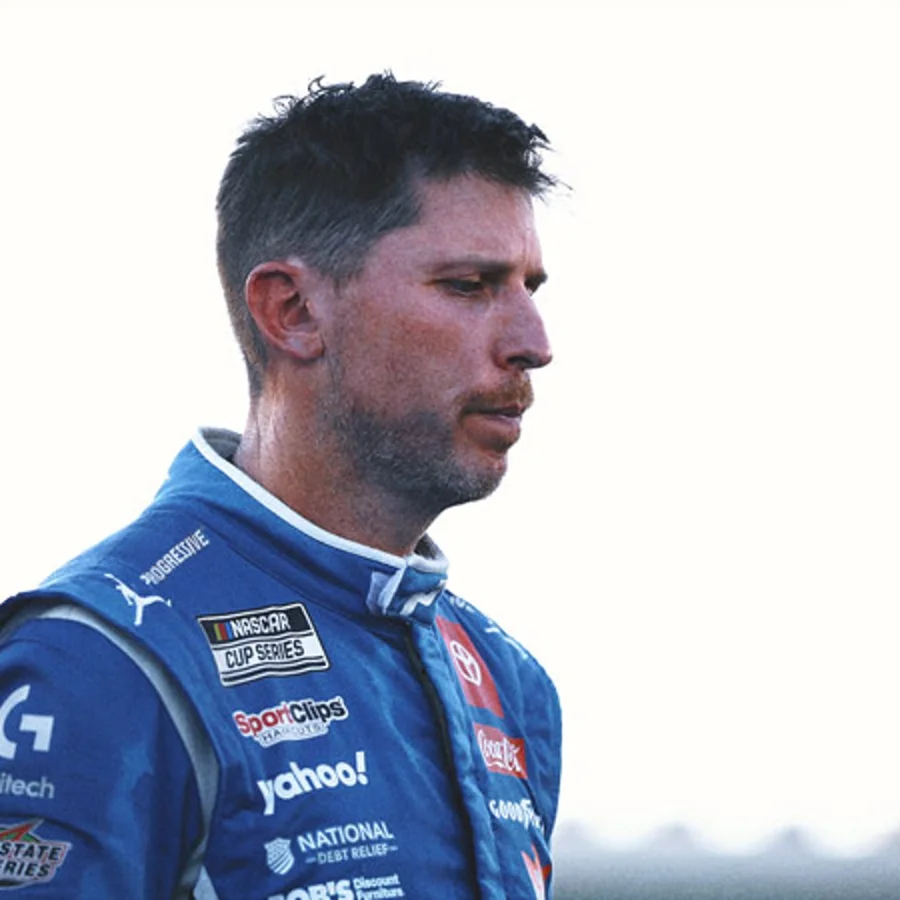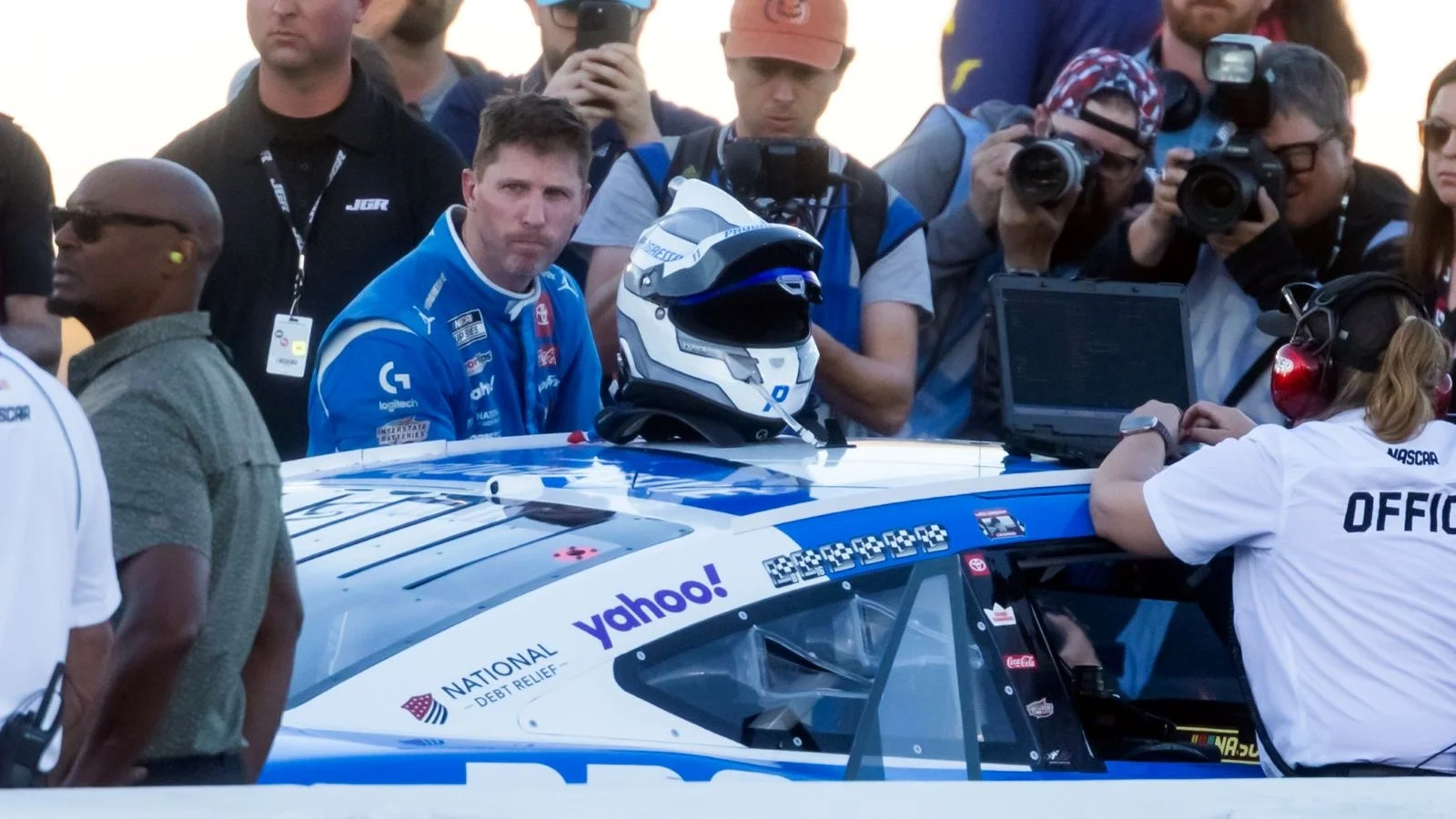The latest developments in the Denny Hamlin NASCAR lawsuit updates reveal rising tensions in the courtroom as Judge Kenneth Bell issued a stern warning to 23XI Racing and Front Row Motorsports, cautioning both teams not to assume victory or expect a massive damages payout. This legal showdown, unfolding just before the highly anticipated charter trial, is set against the backdrop of claims involving antitrust violations that could reshape the landscape of premier stock car racing in the United States.
Recent strides by the plaintiffs, 23XI Racing and Front Row Motorsports, seemed to give them early momentum. From securing a market definition favoring their argument to ensuring prominent industry leaders like Rick Hendrick and Roger Penske could be deposed, these teams emerged with several initial rulings in their favor. Judge Bell notably dismissed NASCAR’s counterclaim for failing to demonstrate antitrust injury, further tilting perceptions toward a strong plaintiff position. But, as the trial nears, the judge’s words have introduced a sense of caution and unpredictability into what many believed was a case swinging towards the racing teams’ favor.
Judge Bell Sharpens Warnings as Trial Nears
The courtroom climate intensified as Judge Bell underscored the need for restraint and realism with his latest guidance. He addressed both 23XI Racing and Front Row Motorsports directly, advising them not to presume the jury will agree with their sweeping claims or grant their immense nine-figure damage requests. The judge’s message cut through the optimism of recent legal victories, emphasizing that the outcome, especially regarding the hundreds of millions in potential damages, was far from guaranteed.

This warning comes as the plaintiffs pursue damages on the grounds that NASCAR’s charter system and revenue models stifle competition, limiting financial progression and autonomy for race teams. Under U.S. antitrust law, a finding of substantial harm could triple any determined damages, raising the stakes substantially for the parties involved. Thus, if the jury accepted the plaintiffs’ assertions of a $100 million loss, the payout could soar to $300 million—an amount that would cause shockwaves throughout the business structure of NASCAR.
As the case draws prominent business figures and team owners from across the sport, Judge Bell’s cautionary tone signals a shift away from courtroom spectacle toward a trial laser-focused on evidence and concrete impacts, not reputations or public perceptions. The presiding judge criticized NASCAR for last-minute moves in listing powerhouse teams Hendrick Motorsports and Team Penske as witnesses, branding such maneuvering as “sandbagging” and ensuring the trial maintains a tightly controlled environment where strategy must be disciplined.
“A couple other items:
-As far as how F1 pays out % of profits to its teams, b/c not clear how that is calculated, judge won’t allow speculation on F1 payouts.
-Jim France, Michael Jordan, Curtis Polk not there (not required). Hamlin, Jenkins, Lesa France Kennedy, O’Donnell were. https://t.co/heFK4j0hTw”— Bob Pockrass, FOX Sports Reporter
With the inclusion of significant personalities such as Denny Hamlin, Lesa France Kennedy, and NASCAR Chief Operating Officer Steve O’Donnell in the most recent hearing, and the absence of other top names like Jim France and Michael Jordan (who were not required to attend), the sessions have become a spectacle drawing attention both inside and outside the court room. Bob Pockrass, providing insights on who attended and clarifying which speculative discussions will be permitted, highlighted the judge’s insistence on avoiding conjecture about financial arrangements in Formula One due to the lack of concrete data.
Focus on Facts Over Spectacle in the Legal Battle
Maintaining clarity and relevance, Judge Bell also barred any attempts to embarrass high-profile individuals, ruling their personal wealth—such as that of Michael Jordan or Jim France—irrelevant to the case at hand. He set firm boundaries, making it clear that proceedings would center only on admissible evidence and verified facts, reinforcing a climate where the strategies of both sides would be subject to heavy scrutiny.
This approach reflects the seriousness of the allegations: that NASCAR’s structure unfairly hinders other teams. With the monetary and reputational stakes so high, Bell’s call for discipline within the process brings both sides back to the core arguments, removing opportunities for theatrical distraction or appeal to public sentiment. As a result, team owners, business leaders, and the NASCAR audience alike must prepare for a trial dictated by substance over drama, and where every assertion will require robust substantiation.
Judge Rejects Limitations on Key Depositions
An especially pivotal ruling came as Judge Bell allowed the plaintiffs to question Rick Hendrick and Roger Penske before trial, a significant victory for 23XI Racing and Front Row Motorsports. NASCAR’s attempt to confine these depositions to a narrow set of topics—such as the specifics of the charter system and valuation of new race cars—was rejected. The decision preserved the teams’ ability to explore broader issues, perhaps including possible favoritism, longstanding relationships with the sanctioning body, and any potential impacts on the competitive landscape.
Judge Bell stipulated that this opportunity to depose would continue so long as NASCAR
“irrevocably commits not to call these individuals as trial witnesses.”
This caveat represents an attempt to ensure fairness while keeping the trial efficient and free from unnecessary interruptions or reversals.
Underscoring his commitment to a level playing field, Judge Bell declared:
“The trial of this matter will be publicly and fairly contested under the relevant rules and law, without regard to the notoriety of the companies and individuals involved. No company or individual will be accorded special treatment.”— Judge Kenneth Bell
This statement reinforces the judge’s demand that neither Hendrick, Penske, nor any other industry heavyweight receives preferential handling during the proceedings, regardless of their fame or influence.
The plaintiffs, led by names such as Denny Hamlin and supported by high-profile business partners like Michael Jordan and Curtis Polk, have accused NASCAR of blocking team progress with an anti-competitive approach to charters and finances. By retaining the chance to probe Hendrick and Penske more deeply, they seek to uncover whether familial or organizational ties to NASCAR’s leadership affected treatment across the industry.
The upcoming trial date, set for December 1, has the entirety of the sport’s fanbase, business observers, and key officials—including Steve O’Donnell, Lesa France Kennedy, and Jenkins—on alert for potentially transformative revelations or precedents.
Broader Implications for NASCAR and Motorsport
Beneath the courtroom maneuvers is a fierce debate about how NASCAR’s charter system and profit-sharing structure shape team autonomy and economic opportunity. The outcome of this case stands to determine future access to the sport’s top echelons and define whether new teams can challenge established organizations for prominence and prosperity. If 23XI Racing and Front Row Motorsports succeed in their suit, it could trigger changes to how revenue and power are distributed across all teams, upending the traditional balance maintained by NASCAR for decades.
This intensifying conflict comes at a moment when Formula One’s owners, Liberty Media Corporation, have engaged their own legal advisors to guard against unwanted exposure of their trade secrets in the wake of the antitrust lawsuit. These ripple effects indicate that every facet of elite motorsport business worldwide is carefully monitoring how American courts handle allegations of competitive imbalance and monopoly.
As millions of devoted fans, key industry heavyweights like Roger Penske and Rick Hendrick, and other prominent names keep watch, the fallout from Judge Bell’s upcoming verdict is sure to influence motorsport leagues on both sides of the Atlantic. The judge’s orders clarify that, despite intense public interest and drama, fairness and factual rigor will control the narrative in the trial—a decision that could either affirm or disrupt NASCAR’s powerful status within professional racing.
Looking ahead, the next phase of the legal battle promises continued spectacle, emotional testimony, and strategic pivots from both sides. But Judge Bell’s admonitions remind all parties—and the passionate NASCAR audience—that outcomes will depend not on history or reputation, but on evidence, fairness, and adherence to the rule of law as the trial proceeds.
All eyes turn now to December, where the verdict may well set a powerful precedent for sports competitions and governing bodies across America and beyond.
A couple other items:
-As far as how F1 pays out % of profits to its teams, b/c not clear how that is calculated, judge won't allow speculation on F1 payouts.
-Jim France, Michael Jordan, Curtis Polk not there (not required). Hamlin, Jenkins, Lesa France Kennedy, O'Donnell were. https://t.co/heFK4j0hTw— Bob Pockrass (@bobpockrass) November 12, 2025
